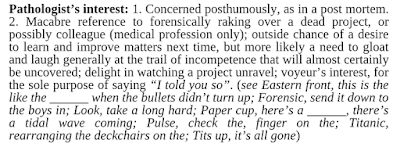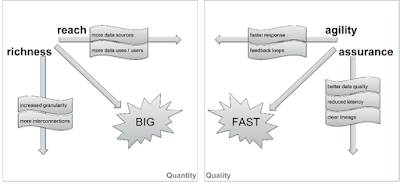@Cybersal @kirstymhall @UKParliament #Brexit #VoxPopuli
A radical Whig tract was published in 1709 under the title Vox Populi, Vox Dei. The following year, an extended version was published under the title The Judgment of whole Kingdoms and Nations. I want to use these two phrases as the starting point for my submission to the UK Parliament Public Administration and Constitutional Affairs Committee, which has launched an inquiry into the lessons that can be learned for future referendums.
The first thing I want to mention is the rushed timescale. The inquiry was announced on July 14th, with a deadline for submissions of September 5th. I shall argue that this rushed timescale is symptomatic of the referendum itself, in which people were asked to make a complex decision with inadequate information and analysis.
(For the sake of comparison, an inquiry on the future of public parks was announced on July 11th, with a deadline of September 30th. So we are given more time to analyse the physical swings and roundabouts of council-run playgrounds than the metaphorical swings and roundabouts of parliamentary sovereignty and media oversight.)
To be fair, most parliamentary inquiries only give you weeks rather than months to compose a submission. This effectively limits submissions to people who have already formed an opinion, and already have the evidence to support this opinion. In other words, experts.
But then most parliamentary inquiries are about issues that people have been concerned about for a much longer time: Bus Services, Employment Opportunities for Young People, Food Waste. There is an existing body of knowledge relating to each of these topics, and it is not unreasonable to ask people to base a submission on their existing knowledge.
In contrast, nobody knew precisely how this referendum was going to be mismanaged until it actually happened. Although many people (including some Brexiteers as well as many Remainiacs) predicted that it would end in tears, and can now say “we told you so”.
I can read you like a magazine … Don’t say I didn’t say I didn’t warn you (Taylor Swift)
No doubt the Select Committee can expect to receive a number of submissions that fall under the heading of what the Dictionary of Business Bullshit calls “Pathologist’s Interest”.
But told-you-so is not a good starting point for a proper analysis, because it concentrates on confirming one’s previous expectations, rather than discovering new patterns. So the Select Committee might not get much well-grounded analysis. Partly because there isn’t time to do it properly, and partly because many of the potential “experts” are affiliated to UK universities, which are currently on summer vacation. Looks like the Select Committee is falling in line with Michael Gove’s idea that “the people in this country have had enough of experts”.
(“The Voice of Gove is the Voice of Government”. I wonder what that would look like in Latin?)
The official announcement sidesteps from “the lessons that can be learned” to “lessons learned”, which is not the same thing at all. The former suggests an open exploration, while the latter suggests merely rattling through a project postmortem for form’s sake. The timescale does not seem particularly conducive to the former. So is this apparent haste triggered by thoughts of a second referendum, or it is just intended to curtail criticism of Parliament for its earlier folly?
As I have argued elsewhere (including my book on Organizational Intelligence) complex sense-making and decision-making cannot go straight from the Instant of Seeing to the Moment of Concluding, but require what Lacan calls Time for Understanding. In this respect, the inquiry repeats one of the errors of the referendum itself.
The timescale and debating rules for the Brexit referendum were modelled on a General Election campaign. But a General Election has three important characteristics that were absent from Brexit. Firstly the electorate is generally familiar with the main parties: Labour and Conservative were around before any of us were born, and the Lib Dems also have long-established roots. Secondly, there is some rough notion of symmetry between the two main parties. Thirdly the parties make promises to which they will be held accountable in the event of victory. In other words, the General Election campaign can be compressed into a matter of weeks precisely because the rules of engagement are broadly understood, and there is very little new material for the electorate to process.
In comparison, as Kirsty Hall argues, the referendum for Scottish Independence was given a lengthy period of debate and analysis, because of the perceived complexity of the issues that needed to be considered. This would have been a much better model for the Brexit referendum.
Finally, let me return to the phrase “the judgement of whole kingdoms and nations”, which of course raises the prickly subject of sovereignty. Although we supposedly have a system of parliamentary sovereignty in this country, parliament occasionally permits the voice of the people to be heard. As the Latin phrase has it, The Voice of the People is the Voice of God; and as the Establishment has discovered, the People can be a vengeful God. Parliament is still learning to listen to this vengeful voice. But who will teach what these lessons mean, and in what timescale? Or will the Establishment just adopt a Brechtian solution?
Would it not be simpler,
If the government simply dissolved the people
And elected another?
#Brechtsit— Richard Veryard (@richardveryard) June 30, 2016
Update: Since I wrote this post, the Electoral Reform Society has published a critical report on the Brexit referendum, which makes the same unfavourable comparison with the Scottish Independence referendum that Kirsty made back in June. The Society has confirmed that it will be making a submission to the Parliamentary Inquiry.
Will Brett, Doing Referendums Differently (Electoral Reform Society, 1 September 2016)
Kirsty Hall, Brexit was a Con (28 June 2016) HT @cybersal @MerrickBadger @Koann
UK Parliament: Future of Public Parks, Lessons Learned from the EU Referendum
Wikipedia: Vox Populi, Vox Dei



